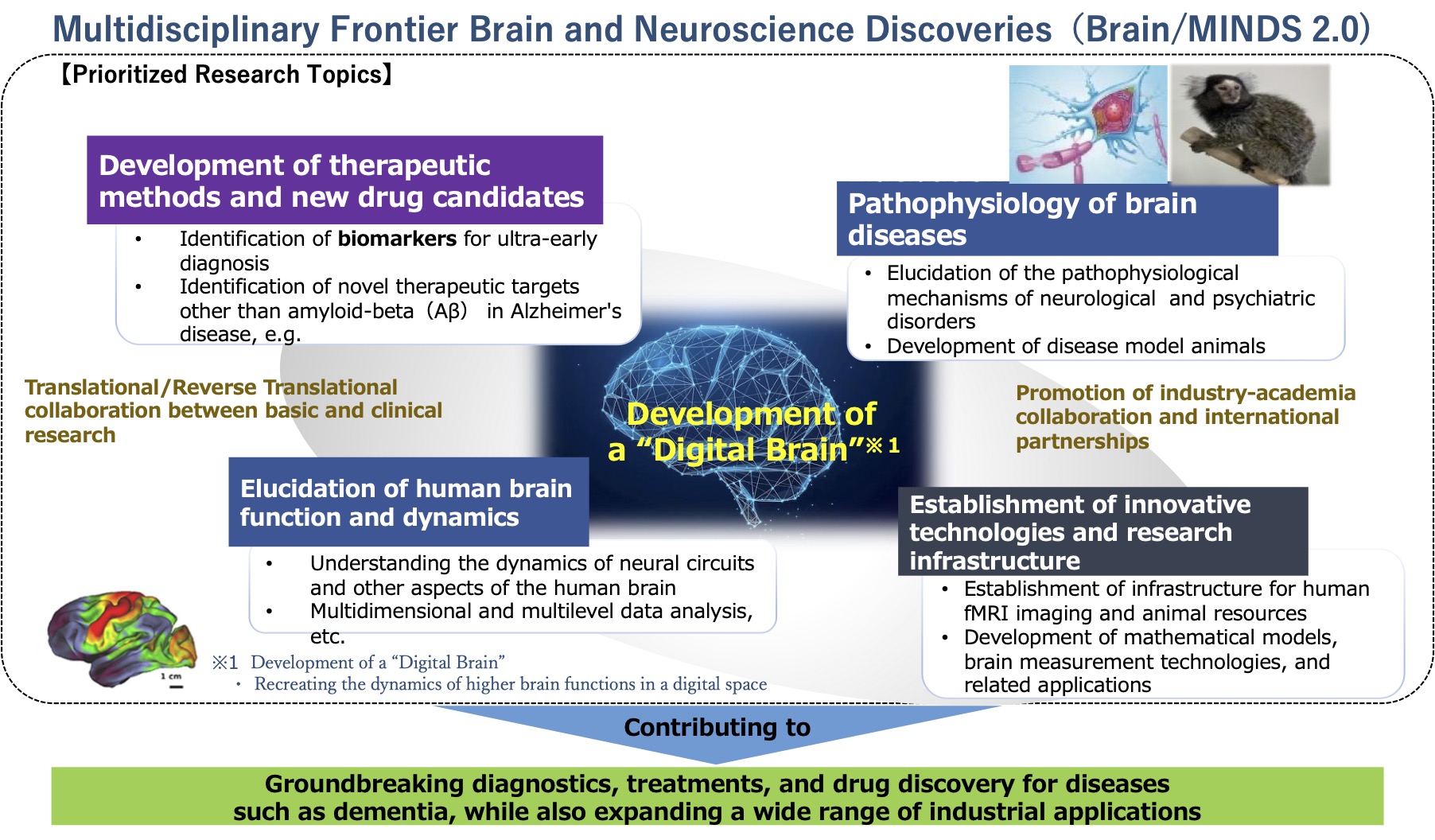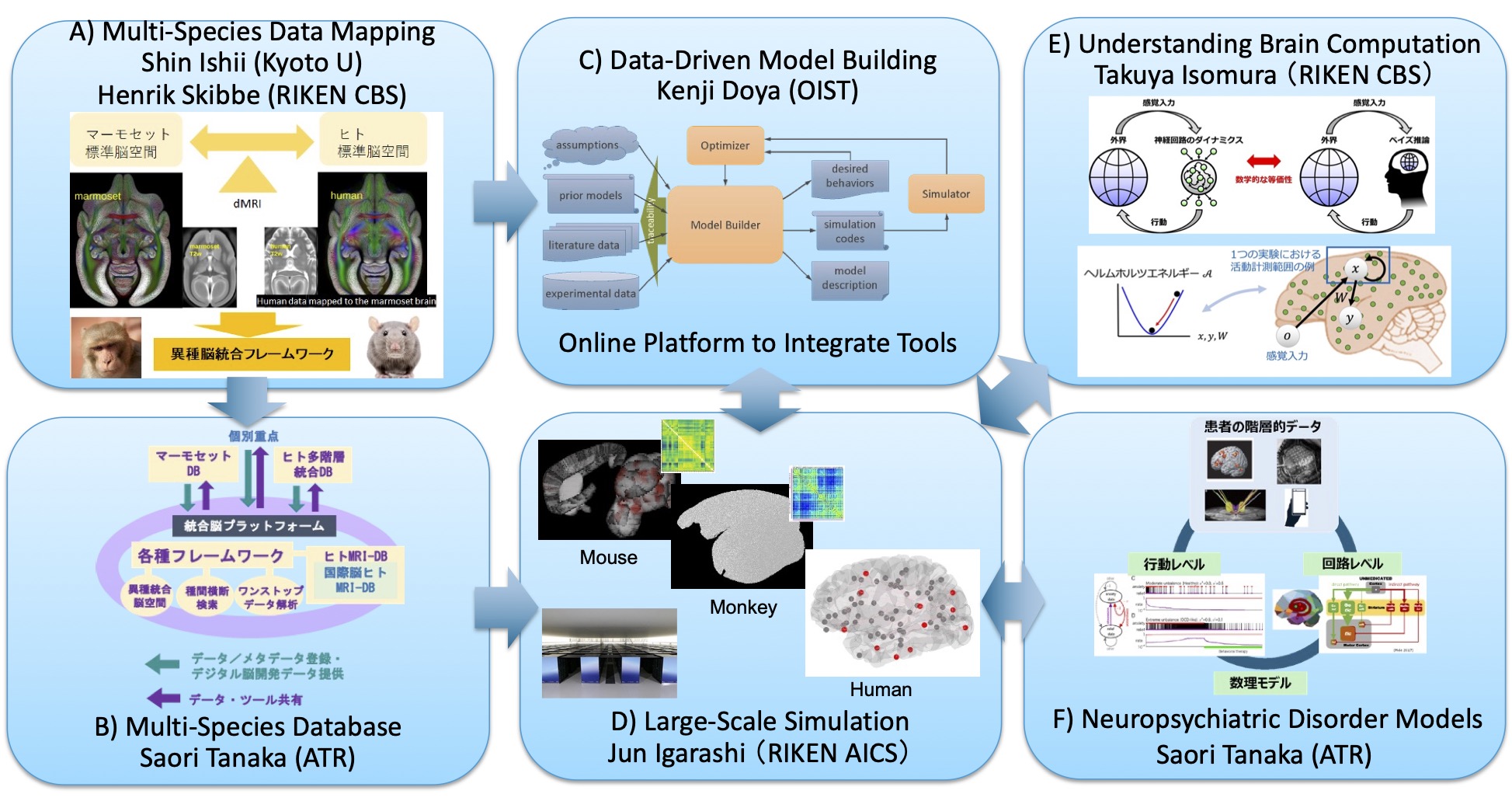Digital Brain Project
Following the conclusion of the Brain/MINDS project (2014-2024), a new six-year program Multidisciplinary Frontier Brain and Neuroscience Discoveries (Brain/MINDS 2.0) has started.
A remarkable feature of this program is that the Digital Brain plays a central role in integrating structural and dynamic brain data from multiple species for understanding brain functions and tackling neuropsychiatric disorders.

Forthcoming Events
- To facilitate discussions about how to build and to utilize digital brains, we organize Digital Brain Seminars. Most of the talks are available on the YouTube channel.
Core Organization
RIKEN and seven partner institutions including OIST, ATR and Kyoto University were selected as the Core Organization. The Group 4 is in charge of Digital Brain Development with the following PIs.
- Shin Ishii, Kyoto University
- Henrik Skibbe, RIKEN CBS
- Saori Tanaka, ATR
- Kenji Doya, OIST (group head)
- Jun Igarashi, RIKEN AICS
- Takuya Isomura, RIKEN CBS (group subhead)

Priority Research Themes
In addition to the core organization, 22 PIs were selected for the priority research on Digital Brain Development.
From 2024
- Yuji Ikegaya, University of Tokyo: External digitization of brain information
- Keiichi Kitajo, National Institute of Natural Sciences: Data assimilation for neurodevelopmental disorders
- Yasuharu Koike, Institute of Science Tokyo: Motion and sensation in VR environments
- Ken Nakae, National Institute of Natural Sciences: Digital twin of common marmoset
- Riichiro Hira, Institute of Science Tokyo: Large-scale compuational neuroscience by LLM
- Tadashi Yamazaki, U Electro-Communications: Scaling microcircuits across species and resolutions
- Yuichi Yamashita, National Center of Neurology and Psychiatry: Mesoscopic digital brain for mental disorders
- Takuto Okuno, Tokyo Metropolitan University: Virtual neuromodulaton and treatment
- Yukiyasu Kamitani, Kyoto University: Neural code conversion between indviduals and species
- Carlos Enrique Gutierrez, OIST: BrainScaler for multi-scale brain modeling
- Zhe Sun, Juntendo University: Brain simulatoin and deep learning by high-dimensional neural data
- Tomohiko Takei, Tamagawa University:ANN modeling of movement disorders
- Mari Tada, Niigata University: Digital atlas of human brain gene expression
- Hiromichi Tsukada, Chubu University: Data-driven whole brain model for etiology
- Akihiro Funamizu, University of Tokyo: Hierarchical cyber brain with genes, circuit and behavior
- Yuichiro Yada, Nagoya University: Abnormal protein accumulation and glia cell network
From 2025
- Hidehiko Takahashi, Institute of Science Tokyo: Internet addiction and ADHD
- Taira Kobayashi, Yamaguchi University: Human brain-body simulation
- Yuta Takahashi, National Center of Neurology and Psychiatry: Micro-macro digital twin brain
- Yusuke Takeda, ATR: Hallucination and delusion in connectome dynamics models
- Kosuka Hamaguchi, Kahoshima University: Transitions of decision making circuites
- Teppei Matsui, Doshisha University: Cross-species brain image translation
Previous Events
-
On October 17-19, 2025, we organized The 2nd Digital Brain Workshop in collaboration with Institute of Mathematics for Industry, Kyoshu University
-
On July 24 and 25, 2025, we organized Three Symposia on the Digital Brain during the Japan Neuroscience Society meeting in Toki Messe, Niigata.
-
On July 23, 2025, we organized a Satellite Symposium: Connecting Digital Brains Across the World for the Japan Neuroscience Society meeting in Toki Messe, Niigata.
-
On September 19-21, 2024, we organized The 1st Digital Brain Workshop in collaboration with Institute of Mathematics for Industry, Kyoshu University